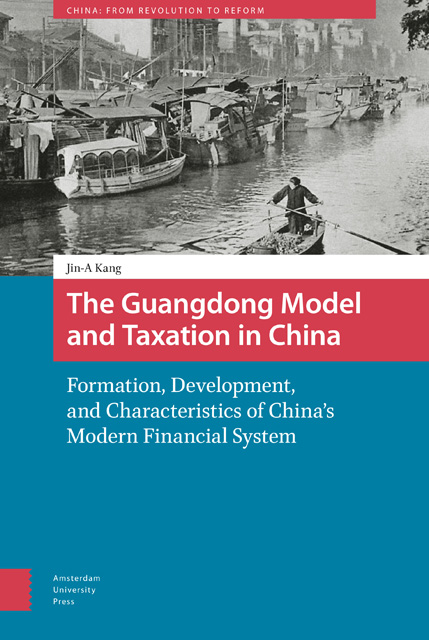 The Guangdong Model and Taxation in China
The Guangdong Model and Taxation in China Book contents
- Frontmatter
- Table of Contents
- Abbreviations
- Acknowledgments
- Introduction: The Modern Transformation of the Imperial Fiscal System: The Case of Provincial Finance in Guangdong
- Part 1 New Tax Revenues in Guangdong during the Republican Era
- Part 2 State-led Industrialization and the State Monopoly
- Part 3 Reform of Tax Collection
- Part 4 The Transition of the Modern Chinese Tax Structure in a Global Context
- Bibliography
- Glossary
- Index
8 - Regularization of the Tax-farming System
Published online by Cambridge University Press: 10 January 2023
- Frontmatter
- Table of Contents
- Abbreviations
- Acknowledgments
- Introduction: The Modern Transformation of the Imperial Fiscal System: The Case of Provincial Finance in Guangdong
- Part 1 New Tax Revenues in Guangdong during the Republican Era
- Part 2 State-led Industrialization and the State Monopoly
- Part 3 Reform of Tax Collection
- Part 4 The Transition of the Modern Chinese Tax Structure in a Global Context
- Bibliography
- Glossary
- Index
Summary
Abstract
The tax contract system reform in Guangdong province under the separatist rule in the 1930s faithfully adopted Song Ziwen's original reform program in the 1920s. But Guangdong provincial government in the 1930s attempted to systematize it more skillfully by introducing a full-scale open-bid contract. This chapter demonstrates the specific process of the tax-farming contract using five files related to the tax contractors, found among the documents of the Department of Finance, Guangdong Provincial Archives. Chapter 8 shows the vitality and merits of the tax contract system to appeal to the government and the taxpayers. For a government with weak administrative capacity, soliciting tax contractors was an attractive option to minimize tax costs and secure a fixed amount of tax revenue.
Keywords: tax-farming. Guangdong, tax contractors, Republican China
The process of tax-farming
This chapter demonstrates the specific process of the tax-farming contract using five files related to the tax contractors, found among the documents of the Department of Finance, Guangdong Provincial Archives. Table 8.1 below provides an overview of each cited file.
File No. 3 focuses on a provincial level contractor completing a oneyear contract term without a problem. The other files are all related to sub-provincial contract issues. No. 5 is a compilation of documents about the process of changing from a contract to a government agency for tax collection. File Nos. 1, 2, and 4, related to debt collection, provide many clues to understanding the operations of the contract company. These contractors were all in default on their monthly rent. The Department of Finance confiscated their securities and assets, and sometimes ordered that the company's shareholders be arrested in order to collect the debt. In the course of events, the merchants began to bargain with the authorities and requested that the government reduce rent arrears or release what had been confiscated.
The bid opening and the process of awarding a contract
Beginning in 1932, the Guangdong provincial government (hereafter, the GPG) introduced public bidding competition for all tax-farming in Guangdong. Yongchang Company of in File No. 4 won the contract for the 1933 taxation on pig exports from Hainan Island.
- Type
- Chapter
- Information
- The Guangdong Model and Taxation in ChinaFormation, Development, and Characteristics of China's Modern Financial System, pp. 193 - 212Publisher: Amsterdam University PressPrint publication year: 2022
